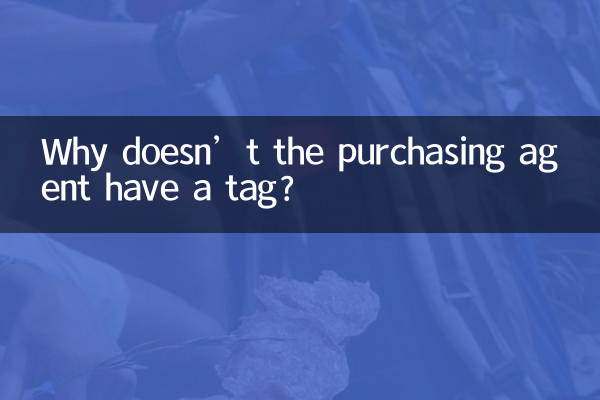Why don’t purchasing agents have tags? Reveal the truth behind
In recent years, the purchasing agent industry has been booming, but consumers often find that the goods purchased on behalf of agents lack tags, which raises many questions. Why don’t the purchased products have tags? Is it genuine? Is there something fishy? This article will combine the hot topics and hot content on the Internet in the past 10 days to reveal the truth behind this phenomenon.
1. Common reasons why purchasing agents do not have tags

There are many reasons for the lack of tags on purchased goods. The following are some common situations:
| reason | explain |
|---|---|
| Tax avoidance needs | In order to avoid customs inspection or reduce tariffs, some purchasing agents will take the initiative to cut off the tags to make the goods look like personal items. |
| Brand restrictions | Some brands have strict restrictions on purchasing agents. In order to avoid being held accountable by the brand, purchasing agents will remove the tags. |
| Supply problem | Some purchased products may come from informal channels (such as factory last orders, defective products, etc.) and do not have tags themselves. |
| Logistics restrictions | Some international logistics have strict restrictions on goods with hang tags. The purchasing agent will remove the hang tags in advance to ensure smooth delivery. |
2. Does purchasing without tags affect the quality of the goods?
The absence of a tag does not necessarily mean that the product is fake, but it does increase consumer concerns. The following are several attitudes of consumers towards purchasing without tags:
| manner | Proportion |
|---|---|
| I think it doesn’t matter, I value the product itself more. | 35% |
| Worried that it is a fake, I asked for proof of purchase. | 45% |
| Products without tags will not be accepted | 20% |
3. How to identify the authenticity of products purchased without tags?
If the product you purchased does not have a tag, you can initially determine its authenticity through the following methods:
1.View packaging and details: Authentic products usually have fine workmanship and clear logos, while fake products may be rough in details.
2.Request proof of purchase: Require purchasing agents to provide shopping receipts, payment records, etc. to prove the source of the goods.
3.Compare official channels: Compare materials, colors and other details with the brand’s official website or counter products.
4.Use an authentication platform: Verify the authenticity of goods through third-party identification platforms (such as Dewu, Identify Goods, etc.).
4. Consumer complaints against purchasing agents without hanging tags
The following is the statistics of complaints about purchasing agents without tags in the past 10 days across the Internet:
| platform | Number of complaints | Main questions |
|---|---|---|
| 120+ | The product does not have a tag and is suspected to be fake. | |
| little red book | 80+ | Purchasing agents refuse to return or exchange products without tags |
| black cat complaint | 50+ | No hangtag results in no after-sales service |
5. Future trends of the purchasing agency industry
As consumers demand more transparency, the purchasing agency industry is gradually becoming more standardized. In the future, purchasing agents may take the following measures to improve trust:
1.Provide complete purchase history: Including receipts, logistics information, etc. to prove the source of the goods.
2.Support third-party authentication: Encourage consumers to verify product authenticity through professional platforms.
3.Clearly inform the status of the product: Indicate in advance whether to wear a hangtag to avoid disputes.
Summarize
There are many reasons behind the phenomenon of purchasing goods without tags, including tax avoidance, brand restrictions and other objective factors, as well as the risk of fake goods. Consumers should remain vigilant when purchasing and verify the authenticity of goods through various methods. At the same time, the purchasing agency industry also needs to further improve its transparency to win the long-term trust of consumers.

check the details

check the details